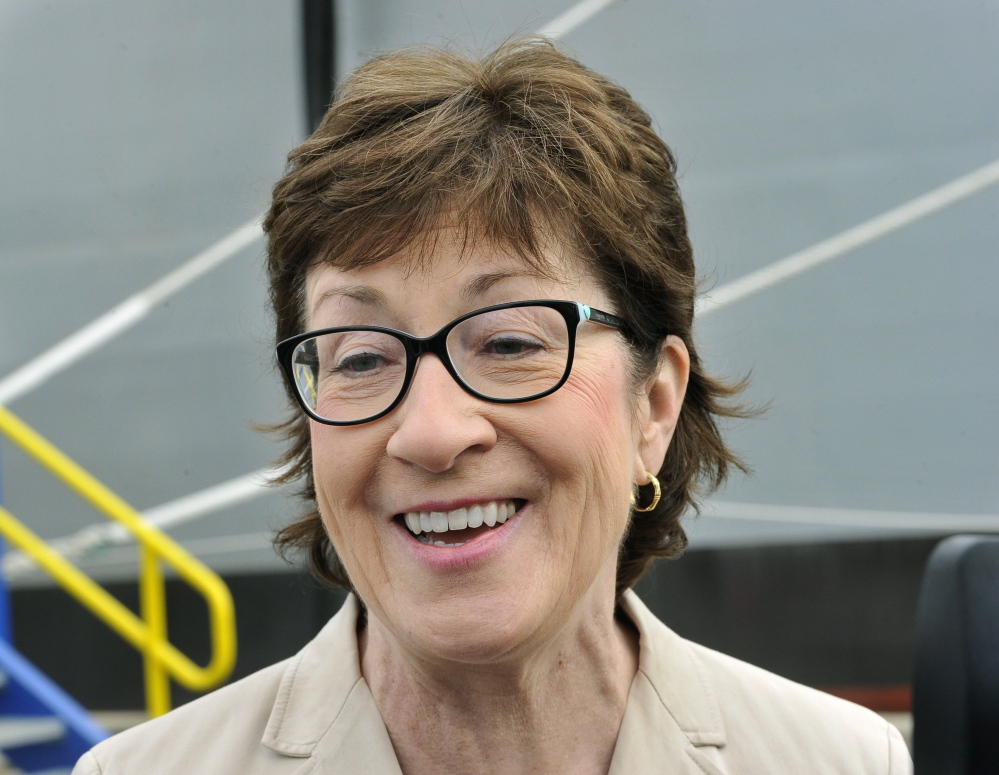KITTERY — Sen. Susan Collins today assumes a leadership position on a key transportation committee, a position she hopes to use to push for a stable funding source for highway and transit projects.
Among the ideas she’s exploring are indexing the gas tax to inflation while providing a rebate to low-income people, and she says she’s “intrigued” by a plan developed by Sen. Rand Paul, R-Ky, to fund the Highway Trust Fund with a tax break for corporations if they repatriate profits stashed abroad.
Collins had been the ranking Republican on the transportation subcommittee for the Senate Appropriations Committee. But now that the majority of the U.S. Senate has shifted to the Republican side, she becomes the chair.
Maine’s senior senator discussed transportation funding in Kittery on Monday during the ceremonial start of a project to replace the Sarah Mildred Long bridge, the aging bridge that connects Portsmouth, N.H., and Kittery, a busy conduit that serves an estimated 14,000 drivers daily — many of them commuting to jobs at Portsmouth Naval Shipyard — and trains that deliver materials to the yard. She was joined by Gregory Nadeau, acting administrator of the Federal Highway Administration, a Democrat from Lewiston.
Despite their partisan differences, both agree that the current system for funding highway and transit projects is broken.
“It’s extremely inefficient,” said Nadeau. ” We need to have some long-term stability.”
Complex and expensive projects that take several years to build are difficult under the current system, said Nadeau, who noted that planning to replace the Sarah Mildred Long bridge began during Gov. John Baldacci’s administration. He said projects are often delayed while state officials take years to assemble funding.
Nadeau is lobbying for the Grow America Act, the $302 billion Obama administration proposal to fund the nation’s highway and transit projects for four years. The act also includes $5 billion for the Transportation Investment Generating Economic Recovery program — the TIGER program — a competitive, discretionary transportation program that was part of the Obama administration’s stimulus package in 2009.
TIGER funds were instrumental in paying for the Long bridge project, which received $25 million, one of the nation’s largest TIGER grants awarded last year and a key part of the financing for the $170 million project.
Collins, a strong advocate of TIGER, wants to make the program permanent, but she doesn’t endorse the Grow America Act because of concerns over funding mechanisms.
Collins does acknowledge the financing of the Highway Trust Fund is antiquated and needs updating to respond to a growing list of transportation projects.
Currently, the Highway Trust Fund is financed by an 18.4 cents-per-gallon federal gas tax, a rate that hasn’t increased since 1993. Moreover, because vehicles are now generally more fuel efficient than they were 22 years ago, Americans are spending less money on gas, which generates less in fuel taxes. However, the same number of miles are being driven causing the same level of wear-and-tear on the roads.
The shortfall between gas tax revenue and the costs of highway improvements will top $160 billion over the next decade, according to the Tax Policy Center, a joint venture of the Urban Institute and the Brookings Institution.
Over the past decade, Congress has dealt with the funding shortfall by passing 21 short-term spending measures that transfer money from the general fund to the Highway Trust Fund. A 10-month extension to the Highway Trust Fund is set to expire at the end of May 2015.
Democrats want to raise the federal gas tax, a move that could be politically palatable given recent falling gas prices. Republicans, however, will fight the effort to raise taxes at the federal level and try to cut non-highway spending out of the fund, arguing that mass transit programs such as rail systems do not pay into the program.
Getting an agreement through Congress will be a challenge, Collins said.
“It is really difficult to come up with a solution,” she said. “But the current system, in which the Highway Trust Fund runs out of money every year and we come up with a patch, is not reasonable in the long term.”
Collins said she’s worried that increasing the gas tax to account for inflation would burden low-income residents in Maine who have no other choice but to use private vehicles to get to work. She said it would help if low-income residents could get a rebate of the additional fuel taxes they pay when they file their federal income taxes. The rebate would be calculated on the mileage drivers report to their municipalities when they pay their local vehicle excise tax.
Collins also thinks Paul’s idea to earmark money for transportation projects deserves consideration. Paul has proposed establishing a corporate tax rate for U.S. companies that have opted to incorporate overseas to avoid taxes here. The lower rate would serve as an inducement to get the companies back on American soil, and the money raised through the tax would be directed toward emergency transportation and infrastructure projects.
Collins said state transportation officials struggle to plan for projects when the funding sources are uncertain year-to-year, she said. The uncertainty increases the risk for construction companies that bid on projects. To hedge against that risk, the companies often increase their bids to make up for the possibility that federal funding will be interrupted. That, in turn, means federal projects are more expensive than they need to be.
Federal funds account for 48 percent of the capital budget for the Maine Department of Transportation. David Bernhardt, the department’s commissioner, said it’s difficult to plan and spend money on project engineering when it’s unclear whether there will be any money available.
“You are assuming what you will have for federal funding,” Bernhardt said.
Tom Bell — 791-6369
tbell@pressherald.com
@TomBellPortland
Send questions/comments to the editors.



Comments are no longer available on this story